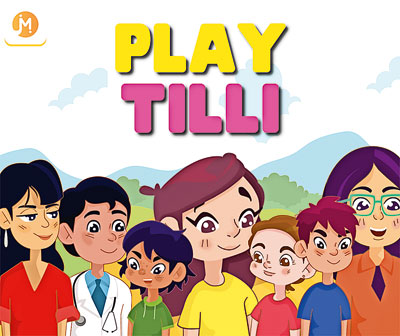Tilli: A learning tool for empathy, critical thinking and meta-cognition
View(s): A game-based, social-emotional learning tool called ‘Tilli’ was recently released on multiple platforms by a team of young innovators. Co-founder at Without Borders, a community education based non-profit, Kavindya Thennakoon spoke to the Education Times on their creation. Tilli empowers five to ten year olds to stay safe, healthy, and happy while targeting three skills: empathy, critical thinking and meta-cognition.
A game-based, social-emotional learning tool called ‘Tilli’ was recently released on multiple platforms by a team of young innovators. Co-founder at Without Borders, a community education based non-profit, Kavindya Thennakoon spoke to the Education Times on their creation. Tilli empowers five to ten year olds to stay safe, healthy, and happy while targeting three skills: empathy, critical thinking and meta-cognition.
“These three core skills are linked to everything from better academic outcomes and job market prospects to more positive mental health outcomes later in a child’s life,” Ms. Thennakoon said.
Meta-cognition is, in simple terms, thinking about our thinking. It is a higher-order skill that forms the basis of everything from social-emotional learning to STEM-related competencies. It helps learners take control of their own learning by empowering them to reflect, think critically, and understand how unique their thought processes are.
“This in turn helps them make sense of nuances beyond the binaries of what is traditionally considered a correct versus the wrong answer,” Ms. Thennakoon said.
Tilli’s special focus on meta-cognition helped train children to make better sense of their own emotions, think critically and empathetically about the world around them and creatively solve everyday problems. It used interactive game-mechanics and engaging stories to help kids learn, apply and internalise crucial skills, mindsets and tools.
The game had several modules on topics like trust, bodies, boundaries, consent and emotional regulation. Every module helped children build their empathy, improve their critical thinking skills, and enhance their meta-cognition.
Ms. Thennakoon also mentioned that their research paper outlining the design and development process of Tilli was recently published by Stanford and was accessible on their website.
 Tilli had been made available on multiple platforms in order to increase faster accessibility. The current mobile version launched, was a mini-game of the ‘Trust’ module. It taught some key concepts around trust through ‘Tilli’ and the people in her life. It could be accessed from anywhere in the world via a smartphone or device. It could also be downloaded and played via IMI games using the QR code attached to this article.
Tilli had been made available on multiple platforms in order to increase faster accessibility. The current mobile version launched, was a mini-game of the ‘Trust’ module. It taught some key concepts around trust through ‘Tilli’ and the people in her life. It could be accessed from anywhere in the world via a smartphone or device. It could also be downloaded and played via IMI games using the QR code attached to this article.
The team behind Tilli had also constructed a physical learning kit that they are able to send across to teachers and educators to be used in their classrooms or communities. Interested educators could reach out to the team and access this kit at tilliforkids@gmail.com. The inspiration for Tilli stemmed from an ambitious dream of ensuring that no child grows up to face (or create) any situation of sexual abuse, assault or violence.
“We fiercely believe that social-emotional learning interventions when designed well and delivered as early as the age of five have the power to reverse cycles of violence,” said Ms. Thennakoon.
She said she built Tilli with her own seven-year-old self in mind. Her co-founded non-profit, Without Borders, worked with communities across Sri Lanka, engaging with schools, teachers and local officials trying to find a more effective, sustainable learning-based solution to the issue of gender-based violence. Their work laid the foundation of the research that was applied in the creation of Tilli which was a result of five years of user-testing, community-based research and iteration.
The team includes Vidya Sri, a leading women’s rights activist and scholar who led the Initiative on Violence Against Women at Carr Center, Harvard Kennedy School, and the projects team at Without Borders. The research that crafted Tilli was supported by and based at the Stanford School of Education.
The mobile game version of Tilli recenlty launched in Sri Lanka was designed by IMI Games at Arimac, where the creators were able to partner with Sri Lanka’s most experienced game designers. The research phase was supported by a driven local team where it was user-tested with over 100 children and adults from Anuradhapura to Galle.
Tilli’s creators are currently working on building a fully-fledged mobile version that integrates more interactive game mechanics and features for parents to track and measure their child’s learning while also working on building a physical learning kit for Tilli specifically designed for classrooms, kindergartens, and community learning centers.
“Accessibility is at the heart of what we do and we want to ensure that every child is able to access and make use of Tilli irrespective of internet access,” Ms. Thennakoon said.
Since the team used a research-backed approach to learning experience design, the content and tools were also constantly user-tested to measure learning and to understand how children respond to the tool. She also invited interested stakeholders to visit www.tillikids.org to join their waitlist and get more regular updates and learning tools.
Kavindya Thennakoon hoped to expand the innovation by connecting with organisations willing to support their work and help them reach more schools, classrooms, and young parents. In the spirit of constant improvement and research-based contribution, she believed interaction with the app and any feedback given would support their efforts to make Tilli better for every child that accessed it.
(Tharushi Weerasinghe)


